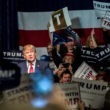Mérida, Yucatán
In 2013, my friend Juan’s cousin disappeared while attempting to cross from Mexico into the United States to return to his job at a restaurant in Florida. The cousin had successfully crossed the border on several previous occasions, and this particular passage, Juan tells me, was reportedly arranged by the restaurant’s proprietor via some human smuggling contacts.
The last his family knew, the cousin had made it to the Mexican border city of Ciudad Juárez. “After that, he was never heard from again,” says Juan. When I visited the family in 2015 in their village outside Puebla, the cousin’s mother—Juan’s aunt—still spent much of her time staring vacantly into space.
The family’s story is far from unique, as the selective criminalization of U.S.-bound migration has rendered the U.S.-Mexican frontier disproportionately lethal. Not only does criminalization make undocumented travelers exceedingly vulnerable to abuse, ever-expanding border fortifications have forced migrants into more perilous routes through the desert, which has become a cemetery of sorts. Juan himself—now a resident of Mérida on the Yucatán peninsula—once entered the United States by way of the Arizona desert, and describes walking for four days at the mercy of the elements. He throws in a brief rundown of the hazards of seeking cover from border patrol helicopters in cactus patches.
Regarding the prospect of an even more dangerous border landscape under Donald Trump—who has taken the liberty of reducing the Mexican population to rapists, drug dealers, and other bad hombres and has promised a “big, beautiful wall” to keep them out—Juan observes that “walls have never deterred anyone. Especially when there’s a demand for cheap labor in the States.”
The point of a punitive immigration policy has never been to put a stop to undocumented immigration in the first place, but rather to perpetuate its lucrative exploitability. In his 2013 book The Right to Stay Home: How US Policy Drives Mexican Migration, David Bacon writes that “displacement and inequality are as deeply ingrained in the free market economy as they were during the slave trade.” Here, displacement refers to the effects on Mexican communities of policies like the North American Free Trade Agreement (NAFTA), which obliterated the livelihoods of millions of Mexican farmers and otherwise fueled migration by, inter alia, saturating the Mexican market with subsidized agricultural products from the United States in blatant violation of the principles of “free trade.” To be sure, there’s nothing like having one’s subsidized corn and eating it too.
When Mexican victims of displacement reach the United States, the profitability of the inferior value they have been assigned as human beings is confirmed. Bacon explains: “So-called illegal workers produce wealth, but receive a smaller share in return. . . That wage difference is a subsidy, a source of profit for those who employ them.” He notes, however, that, while said employers “depend not just on the workers in the fields and factories but also on the communities from which they come,” they’re not exactly in the business of contributing to schools or health clinics in Mexico, leaving undocumented workers essentially responsible for “pay[ing] the social costs of producing more workers through the remittances they send home.”
Trump’s new-and-improved battlefield will mean lots of money for rich people and corporations.
One could argue that branding migrants as “illegal” and therefore perennially subject to deportation is a useful method for keeping workers in line—i.e. preventing them from demanding too many rights or a decent wage—while the “legal” U.S. population can also be frightened into submission by the presence of folks willing to work for less. The migrant bogeyman furthermore provides a convenient scapegoat and distraction from U.S. government transgressions and societal malaise.
So, the current immigration policy would appear to be a win-win-win-win-win situation for the American ruling class, right?
Wrong—at least according to the new head of state, whose talents include behaving in such transparently batty and sociopathic fashion as to make his predecessors appear almost sane and benevolent. Listening to Trump, you’d have no idea that Barack Obama presided over some 2.5 million deportations during his two terms in office—more than all 20th-century U.S. presidents combined. Here in Mérida, I met a young man deported by Obama after living in the United States from the age of two to the age of 24, whose “crime” was to have been in attendance at a party interrupted by police due to a noise complaint. The rest of his family remains in the States.
While Obama refrained from foaming at the mouth re: Mexican rapist-invaders, he did oversee the increasing militarization of the border, thereby helping to enable an array of human tragedies such as the disappearance of Juan’s cousin. In a recent email chat with Todd Miller, author of Border Patrol Nation: Dispatches from the Front Lines of Homeland Security, I asked Miller to comment on the precedents of Trump’s own militarized fantasies. Miller recalled a telling encounter with a representative of the Arizona-based firm StrongWatch, at the 2012 Border Security Expo in Phoenix.
StrongWatch was pursuing a juicy contract on the U.S.-Mexico border after various stints catering to the surveillance needs of the U.S. military in Iraq and Afghanistan. The representative, Miller remembers, remarked that “we are bringing the battlefield to the border.”
Trump’s new-and-improved battlefield will similarly mean lots of money for rich people and corporations; the wall alone is estimated to cost more than $20 billion. Miller told me that the construction of a contiguous concrete wall is less likely than “the continual fortification of an electronic virtual wall, built with surveillance towers, high-tech cameras, drones, motion sensors, and control rooms.” The latter arrangement, he said, “not only turns border areas into permanent low-intensity war zones, but also garners serious profits for companies long in the war business such as Elbit Systems, Lockheed Martin, and Boeing.”
Thanks to Trump’s war on logic, meanwhile, NAFTA has now been exposed as a nasty Mexican plot to punish the United States and dominate the universe. But whatever trade agreement revisions are ultimately spawned during the Trump era, it’s safe to assume that the displacement-inequality formula outlined by Bacon will remain valid—and that undocumented migrants will face ever greater existential threats, especially given that xenophobia and racism are now apparently things that “make America great again.”
Here in Mexico I also spoke with Arturo Cano, a journalist with the prominent Mexican daily La Jornada, who suggested that Trump represents the confirmation that “there will be no change in the complex asymmetrical relationship” between the United States and its southern neighbor. Each brings something to the relationship, of course: “Mexico provides the cheap labor and the U.S. provides the deportees. Mexico provides the dead and disappeared and the U.S. the armies of drug users.”
Lamenting the idea that “submission to empire” has been incorporated into the modus operandi of the Mexican elite, Cano quoted a phrase attributed to Mexican dictator Porfirio Díaz over a century ago: “Poor Mexico, so far from God, so close to the United States.” Today, as the United States seeks to distance itself from humanity on every level, the two nations are unfortunately closer than ever.
Belén Fernández is the author of The Imperial Messenger: Thomas Friedman at Work (Verso). She is a contributing editor at Jacobin magazine.







0 Comments